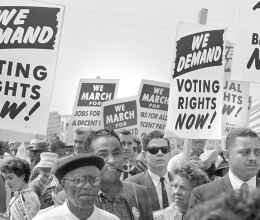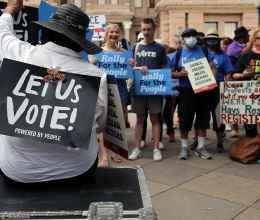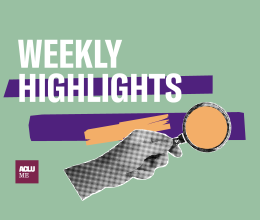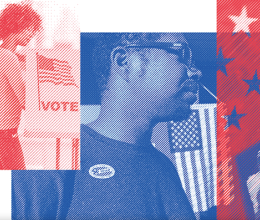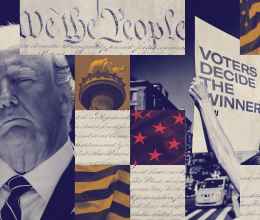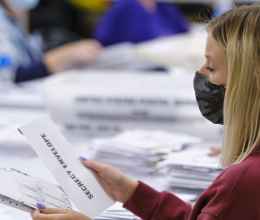Leaders of nonprofit organizations from across Maine – including labor unions, pro-democracy organizations and equal-rights advocates – are urging their members to vote “no” on Question 1 this November.
Question 1 reads: “Do you want to change Maine election laws to eliminate two days of absentee voting, prohibit requests for absentee ballots by phone or family members, end ongoing absentee voter status for seniors and people with disabilities, ban prepaid postage on absentee ballot return envelopes, limit the number of drop boxes, require voters to show certain photo ID before voting, and make other changes to our elections?”
What they’re saying:
League of Women Voters of Maine President Jill Ward:
"The League has a long history of standing up for all voters, and Question 1 is not only bad for Maine, it's bad for Maine voters. If implemented, Question 1 would make it harder for Mainers to vote on Election Day or with an absentee ballot. We want to protect Mainers’ access to vote, regardless of who they vote for, and that’s why we are asking for Mainer's to vote No on 1.”
Disability Rights Maine Executive Director Kim Moody:
"Special circumstances absentee voting begins today. This is a critically important option for people with disabilities who may suddenly find themselves hospitalized days before an election. This option enables a voter to have a family member or third party pick up their absentee ballot – and bring it to them to complete. If Question 1 passes, it is unclear if this law will remain in effect. Protect the right to vote absentee in emergencies and vote no on Question 1."
Maine Conservation Voters Policy & Partnerships Director Nicholas Janzen:
“Maine’s absentee voting system is safe, secure, and accessible; literally hundreds of thousands of Mainers every year rely on absentee voting. Question 1 proposes a raft of unnecessary and harmful measures that would only make it harder for eligible Maine voters to cast their ballot. It is a clear and direct attack on the voting rights of Mainers who vote absentee.”
Wabanaki Alliance:
“The Wabanaki Alliance is a proud partner of the Save Maine Absentee Voting campaign and stands in strong opposition to this measure, which would create unnecessary barriers to voting and disproportionately harm our citizens. For the Wabanaki Nations, the right to vote is sacred and the result of a hard-won battle by our ancestors. Voting rights weren’t extended to Wabanaki citizens in Maine until 1967, decades after federal voting rights for indigenous people were passed in 1924. Another deeply troubling aspect of this ballot measure is that it explicitly excludes Tribal Identification from the list of acceptable forms of voter ID. As federally recognized tribal nations, we value our tribal sovereignty and self-determination. This exclusion seeks to invalidate and undermine the ability to identify our people and have that authorization respected. As the original stewards of these lands and waters now called Maine since time immemorial, we find it imperative to assert this right and have it honored.
“Question 1 is not a measure to secure our elections. It is a measure to suppress votes. The Wabanaki Alliance urges all Maine voters to vote NO on Question 1 this November to protect the right to vote for all Mainers.”
Maine Youth Power Co-Director Phoebe Dolan:
“Question 1 threatens the ability for young Mainers, elderly Mainers and Mainers with disabilities to vote. We know this from the data and anecdotally from talking all month long with voters at their doors. It is a blatant attempt to suppress all Maine voters, especially young people who are working, in school or without a ride on Election Day.”
EqualityMaine Executive Director Gia Drew:
“If passed, this referendum would add more barriers to the ballot box, especially for older adults, disabled Mainers, Mainers without reliable transportation, and trans people. Everyone deserves the freedom to vote safely and securely in a way that works for them. This measure would strip those valued opportunities away.”
ACLU of Maine Executive Director Molly Curren Rowles:
“We urge all Maine voters to keep our elections safe, secure, and accessible by voting no on Question 1. Mainers have long understood that no matter who we vote for, voting rights matter to all of us. The right to vote is foundational for all other rights and freedoms. Question 1 would make it harder for all Maine voters to cast a ballot, but would especially burden elders, people with disabilities, working parents, and rural voters. Vote no on Question 1 to maintain secure and accessible elections in Maine."
AFL-CIO Legislative and Political Director Adam Goode:
"Absentee voting is very important to many workers who do shift work, work irregular hours, commute long distances or are subject to mandatory overtime – all of which create unpredictable work schedules. Workers in the trades often travel long distances to their job sites. Firefighters regularly work 24-hour shifts. Mill workers are subject to forced overtime and lineworkers have uncertain schedules due to weather emergencies. This November, Maine voters will consider restrictions on absentee voting when we vote on Question 1. This ballot question will make it harder for people across the state to vote – especially seniors, Mainers with a disability and Mainers without reliable transportation. The Maine AFL-CIO opposes Question 1 because it would create roadblocks for Mainers to vote."
MSEA-SEIU retiree member Lois Baxter:
“I am a retired state employee, union leader, mother and grandmother, and I want to see a stronger democracy for my kids and grandchildren. We have an opportunity to defend the strong election system we have in Maine this November. I believe we must vote ‘no’ on Question 1 to do so. If Question 1 passes, this could take away access to the right to vote for thousands of Mainers and will, in my view, put us on the wrong path.
Maine People’s Alliance Co-Director Amy Halsted:
“Question 1 would make it much harder for nearly half the state’s residents to have their voices heard and votes counted—and we don’t think that’s right. No matter your work schedule, your physical ability, or whether you live in the most rural areas of the state, no one should face barriers when casting their ballot.”
Natural Resources Council of Maine:
“A healthy environment relies on a healthy democracy. Much of our work is done in the State House, building coalitions to pass new laws or defeat rollbacks that would weaken Maine’s environmental laws. We can’t do this without strong elections where all residents can make their voices heard, regardless of their party affiliation, driven by our shared love of Maine’s environment.
“Question 1 would undermine Maine’s democratic process by making drastic and sweeping changes to Maine’s elections laws. It is a misleading measure that directly attacks Maine’s popular, effective, and successful absentee voting program that has helped Maine have one of the strongest voting participation rates in the nation.”
Planned Parenthood Maine Action Fund Vice President of Public Affairs Lisa Margulies:
“This measure is an attack on a fair and accessible election system in our state. Forty percent of Maine voters cast absentee ballots in the last election, and the proponents of Question 1 want to take that option away from so many Mainers who might have difficulty exercising their right to vote without it.
“It is not lost on us that the majority of Mainers support access to abortion and related care and have elected to the statehouse a pro-reproductive rights majority twice since the U.S. Supreme Court overturned Roe v. Wade. People opposed to abortion know they are not aligned with Maine values, so they’re employing measures like Question 1 to try and suppress Mainers’ ability to vote.
“Make no mistake: There is a direct connection between this attempt to make it harder for Mainers to exercise their right to vote and efforts to eliminate Mainers’ ability to make decisions about their own bodies, lives and futures.
“We are proud to stand with so many other leaders and champions of democracy in opposition of Question 1. We urge everyone who cares about free and fair elections and about reproductive rights to vote no on Question 1.”
National Vote at Home Institute Chair Phil Keisling:
“Maine’s tradition of citizen involvement includes top voter turnout, which is supported by a secure and accessible absentee voting system. In recent elections, more than 40% of voters — including older voters, women, and those with disabilities — cast absentee ballots. For many, absentee voting is essential to their participation.
“As Oregon’s former chief election official, I believe these needless restrictions could reduce voter participation by tens of thousands of individuals in a general election. That’s equivalent to disenfranchising towns the size of Bangor, Lewiston, or Auburn.”
VoteRiders Executive Director Lauren Kunis:
“The anti-voter provisions laid out in Question 1 would create far-reaching barriers to the ballot box for eligible voters — many of whom have been successfully voting for years. Voter ID laws are part of a broad, well-funded, and deliberate effort to block millions of Americans from the voting booth. Laws like these aren’t about security at the ballot box, they’re about blocking voters from accessing it, which stands to undermine and distort democracy.”
Election Day is Tuesday, Nov. 4. Voters can find their polling place by going to www.JustVoteME.org.
The Save Maine Absentee Voting coalition, which includes more than 35 nonprofit organizations from across Maine, as well as national partners, believes that fair, open, and accessible elections are the cornerstone of our democracy.


